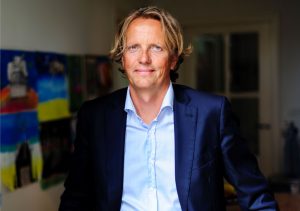The war in Ukraine: a catalyst to make more sustainable choices?
Dirk Lodewijk is CEO of Koopmans Koninklijke Meelfabrieken, and has twenty years of international experience in general and commercial management. For the past ten years, he has been working on the transition to make Koopmans a truly sustainable company. “As a family business, we want our company to still exist in a hundred years. So, we must be future-oriented and look at the long-term.”
Source locally
Koopmans imports wheat. Despite the current supply shortage due to the war in Ukraine, the company is prepared. How come? “We already started looking at sustainability ten years ago. Since then, we’ve developed locally grown wheat.” This locally grown wheat, which took years to create, has been on the market since November 2021, under the brand name Nedertarwe.
“Other companies were skeptical about trying to source grain in the Netherlands, but it has always seemed to us the only sustainable way forward.. To import grain from Kazakhstan, Russia or Ukraine and then transport it by boat to Leeuwarden does not seem logical and sustainable. Besides, it does not fit with the vision of our company at all.” Over 50% of all the wheat Koopmans processes already finds its origin in the Netherlands, the rest is imported from countries like Germany. The goal, however, is to increase this percentage to 70% Dutch wheat. A goal that has, in fact, already been almost achieved. A striking example is Nedertarwe. Nedertarwe is 100% wheat from Dutch soil, that has been cultivated sustainably by certified and progressive farmers according to strict guidelines. This is truly unique in Holland.
At a price
“It’s important to realize that making sustainable choices for your company has a price. It’s not something that happens overnight.” The success of Nedertarwe is a combination of partnership development with farmers and bakers, many, many recipe trials, intensive market research and product branding. Nedertarwe is a result of time, financial and social investment. “It requires a crystal-clear vision”, states Lodewijk.
Recently, BO Akkerbouw and Koninklijke Vereniging Het Comité van Graanhandelaren organized a Theme Day Grains on protein transition with the use of Dutch wheat as its theme. Minister Henk Staghouwer of Agriculture, Nature and Food Quality spoke about connecting the links in the chain to provide the Netherlands with bread made from protein-rich grains from Dutch soil. Minister Staghouwer said the following words about Dutch wheat:
‘When I recently became aware of Koninklijke Koopmans’ ‘Nedertarwe’ initiative, I felt the baker’s blood flowing again. The flour manufacturer has spent years working with farmers and bakers to fine-tune an optimal product. Harvesting, milling, testing and baking trials: if every link in the food chain contributes its expertise, everything will turn out fine. Since I became minister, I have seen many such innovative forms of cooperation and I am always impressed. Such strong chains build the sustainable future of agriculture together”.
Larger impact of Ukraine
Today, we find ourselves in a tense situation. The export of Ukrainian crops is impossible and therefore availability is limited. The result is a fierce increase of price due to availability and uncertainty of supply. It shows the vulnerability of being dependent on the world market. This means that food prices have doubled. “This affects us, our customers and the customers of our customers: the end consumer. In short, it means inflation,” states Lodewijk.
“In Europe, the doubling of these prices is still quite manageable, but other countries, which rely on Ukrainian wheat for instance, like Egypt, are facing a major problem. The world market is finding a new balance. In the meantime prices will stay high. I expect aid programs for countries that cannot afford the higher prices on their own.”
Lecture
The war in Ukraine forces us to find our ingredients elsewhere, and why not start sourcing locally, in the name of the environment. During the lecture, Lodewijk will elaborate on the Nedertarwe project and explain, using this example, what it takes to go local, and thus make successful sustainable choices. It will be an interactive lecture, so everyone is welcome to ask questions that arise.

